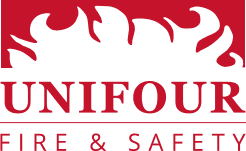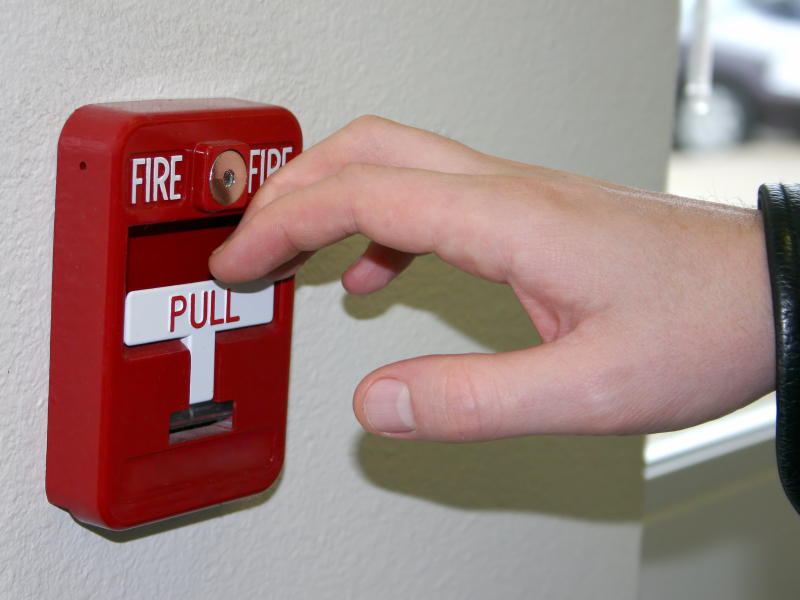
Most Common Fire Code Violations You Should Be Aware Of
Fire safety should be a priority for all, whether at home, at the office, or in public spaces. However, many people unknowingly violate fire safety codes.
Awareness is the first step in prevention, so let’s delve into some of the most common fire code violations you should be aware of.
Fire Department Access Violations
- Unclear property address numbers: The address numbers of a building or home must be clearly visible from the street. This ensures that fire departments can locate your property swiftly during emergencies.
- Unmarked or blocked fire lanes: Fire lanes ensure unobstructed access to buildings for firefighting vehicles. They should be clearly marked according to the city’s ordinance and must never be blocked.
Evacuation Route Hazards
- Blocked exits or fire doors: Exit points and fire doors are critical for ensuring a safe escape in case of fire emergencies. Blocking these areas, even temporarily, is a serious violation. Be sure to keep these areas free from obstacles at all times.
- Inadequate emergency lighting: Emergency lights are a necessity for buildings. They must function for at least 90 minutes when the power is out, ensuring safe evacuation.
- Insufficient fire safety signage: Adequate fire safety signage is crucial for safe evacuation during emergencies. Signs indicating fire exits, extinguisher locations, and emergency assembly points should be clear and well-placed.
- Waste blocking exit doors: Waste or trash must never obstruct exit doors. Regular waste management practices should be observed to ensure clear exit paths.
Fire Prevention & Safety Clearance Issues
- Air diffusers near smoke detectors: Air diffusers can interfere with smoke detectors’ functioning, delaying their activation during a fire. Install your HVAC system and smoke detectors with a safe distance between them.
- Unprotected ceilings: The structural components of your ceiling must be fire-resistant to prevent the rapid spread of flames. Failing to meet the specific fire-resistance ratings for ceiling assemblies is a violation of fire codes.
- Combustible storage near ceilings: Storing combustible materials too close to ceilings can facilitate the quick spread of fire. Keep these items at a safe distance from ceilings and light fixtures.
Electrical Fire Hazards
- Mismanaged electrical panels: Electrical panels missing a fuse/breaker should be covered by an approved filler plate or panel. Exposed panels aren’t just electrical hazards but can also cause fires.
- Unsafe power management: Power strips or surge protectors must not be plugged into another surge protector or extension cord; they should be directly connected to an outlet. This common mispractice can lead to electrical overloads and fires.
- Uncovered electrical and junction boxes: Open electrical/junction boxes are required to have covers, and all wiring must be properly contained to prevent accidental sparks and subsequent fires.
- Improper use of extension cords: Extension cords shouldn’t be used as a permanent solution for power supply needs. Long-term use can lead to wear and tear, causing electrical shorts and possible fires.
Fire Equipment Accessibility & Maintenance Violations
- Misused fire safety rooms: Rooms such as fire pump, riser, and electrical rooms aren’t meant for storage. Storing items in these rooms could hamper their functionality during a fire emergency.
- Inadequate fire alarm management: Fire alarms that are faulty or not regularly tested are a severe risk. Regular maintenance and functionality checks are essential.
- Missing or expired fire extinguishers: Fire extinguishers are essential for putting out small fires. Buildings must have accessible and regularly serviced fire extinguishers.
Prioritize Fire Prevention With Unifour
Our team at Unifour Fire & Safety is committed to helping you understand and navigate the complexities of fire safety codes.
With decades of experience and a team of dedicated professionals, we provide comprehensive fire safety services tailored to your needs.
Fire safety is everyone’s responsibility. Let Unifour Fire & Safety help with your fire protection plan by calling us today.
 Click to Apply
Click to Apply 



